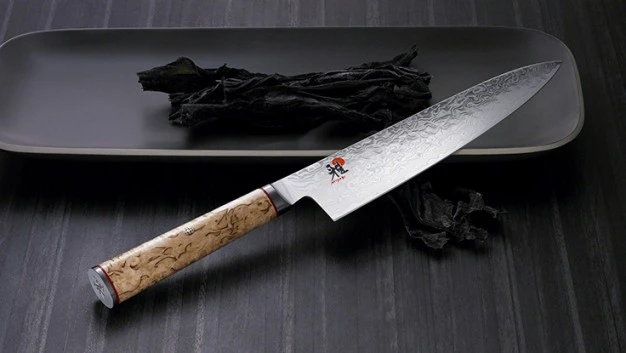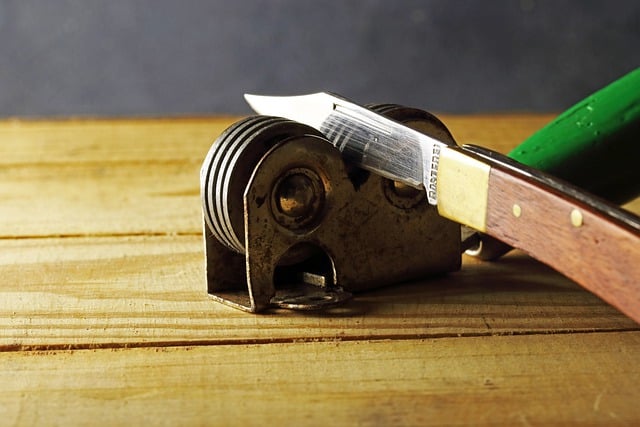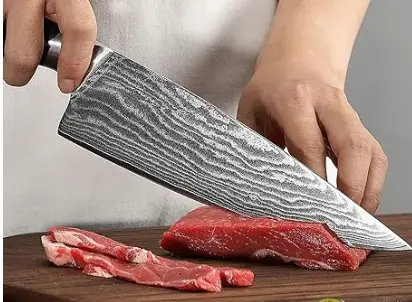What is MC63 Steel?
MC63 steel is a fine-grained high carbon high chromium stainless steel produced following the powder metallurgy process. Henckels uses Takefu SG2 steel under the MC63 steel name to produce some of its Miyabi kitchen knife line.
MC63 steel produces long-lasting, corrosion-resistant, and tough knife blades with the proper heat treatment and tempering. It is also used to manufacture surgical knives and razor blades because it offers excellent corrosion resistance and retains an edge for a very long time.
MC63 Steel Composition (MC63 Steel Chart)
- Carbon C 1.45%: Increases edge retention, hardness, and tensile strength. It also improves steel resistance to wear, abrasion, and corrosion.
- Chromium Cr 16.00%: Increases hardness, tensile strength, and toughness of the blade by forming chromium carbide. The higher than 13% Cr is what makes mc63 “stainless”
- Molybdenum Mo 3.30%: It improves machinability and hardening property.
- Vanadium V 2.20%: Increase wear resistance and toughness, it also improves corrosion resistance.
- Manganese Mn 0.40%: Increases Hardness, and tensile strength but decreases ductility.
- Phosphorus P 0.03%: Improves machinability and hardness but is normally regarded as an impurity affecting performance.
- Sulphur S 0.03% Improves machinability but is normally regarded as an impurity affecting performance.
- Silicon Si 0.50% Improves strength of steel
MC63 steel properties
MC63 Steel Hardness
MC63 steel offers an impressive Rockwell hardness of 63 to 64 HRC. This is very hard steel, attributed to the chromium and carbon content in its composition and the powder metallurgy production method. The high hardness of MC63 positively influences its edge retention and wear resistance, as discussed below.
MC63 Steel Toughness
As a rule of thumb, the toughness of steel reduces when the hardness is high, and this is true with MC63 steel. The toughness level of MC63 can be described as decent. It can handle demanding applications without breaking, but it can bend or chip depending on the impact.
MC63 is not the best knife steel for very challenging applications like batoning. MC63 steel toughness is similar to that of VG10 stainless steel and less compared to that of FC61 stainless steel.
Make your own knife with these accessories
MC63 Steel Wear resistance
MC63 is very resistant to wear, thanks to its high hardness. MC63 knives do not wear quickly from frequent use and sharpening, a property that gives them a longer life span. Being hard steel, it transfers material when used to cut through abrasive objects. This reduces adhesive and abrasive wear, and the knives will serve you for a long time.
MC63 Steel Edge retention
The edge retention of steel determines how long it holds a sharp edge and is directly influenced by its hardness. With a high hardness level of 63HRC, MC63 offers excellent edge retention. This means that it stays sharp for a long time, and you will no longer go through the hustle of frequent sharpening.
Its edge retention is better than most knife steels, it is comparable to the more premium Crucible S35VN stainless steel, Magnacut steel, and slightly better than the popular Bohler N690 stainless steel.
MC63 Steel Corrosion resistance
Does MC63 steel rust? MC63 steel contains enough chromium content to make it stainless steel; therefore, it is resistant to corrosion and rusting. High molybdenum elements in its composition also enhance its corrosion resistance.
The corrosion resistance ability of MC63 stainless steel is higher than most high-end stainless steel. Knives made from this steel can be used in highly corrosive environments like the kitchen, salty water, or high humidity areas without rusting or staining.
MC63 stainless steel is rust-resistant but not rustproof. The steel can still rust if exposed to highly corrosive environments without care. With that in mind, proper care and maintenance are crucial to keeping rust at bay. Clean and dry the knives after use and apply a coat of oil on the blades for storage.
Ease of sharpening MC63 Steel
Many people are almost sure that MC63 is hard to sharpen because it is hard steel. However, despite the excellent wear resistance and high hardness, MC63 is not hard to sharpen, attributed to its balanced chemical composition.
MC63 blades attain a fine edge quickly using simple sharpening tools and minimum sharpening skills because of their fine grain microstructure. The icing on the cake is that it holds the edge for a long time making it easy to maintain.
MC63 steel comparison
MC63 vs VG10
MC63 and VG10 are a product of TAKEFU but are produced following different manufacturing methods. MC63 is produced following the powder metallurgy process, while VG10 is produced conventionally.
Because of the fine microstructure attained from PM manufacturing, MC63 beats VG10 in edge retention and is easier to sharpen. They offer the same level of hardness, toughness, and corrosion resistance.
MC63 vs MC66
MC63 Steel beats MC66 steel in toughness due to its low Rockwell hardness, MC63 is also a much pure alloy and contains less hard brittle carbides. It contains fewer impurities and does not have elements like Tungsten in its composition.
On the other hand, MC66 steel is better than MC63 steel in edge retention because it contains more carbon and chromium elements, which forms hard carbides that enhances its Rockwell hardness which in turn brings about better edge retention and wear resistance.
Is MC63 good knife steel?
The properties of MC63 steel make it excellent knife steel. It offers a more balanced approach in terms of edge retention, corrosion resistance, wear resistance, and toughness.
Due to the fine Microstructure, MC63 stainless steel attains a razor-sharp edge very fast. There is no doubt that Henckel’s MC63 stainless steel is good knife steel as it is easy to maintain, retains an edge for a long, and does not chip or break on regular tasks.



